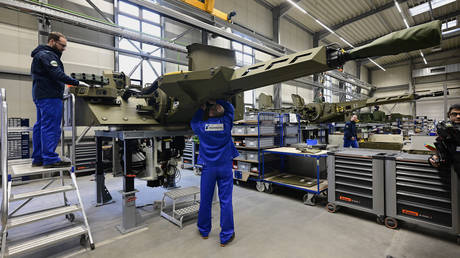German banks exclude arms manufacturers from ethical investment options
Eight financial institutions have chosen to exclude weapons manufacturers from funds that are marketed as socially responsible. This decision stems from a group of German banks expressing their disapproval of incorporating arms manufacturers...

The backdrop to this decision includes a substantial increase in defense spending by Germany and other EU nations following the escalation of the Ukraine conflict in February 2022, which has led to record profits for weapons makers like Rheinmetall due to rising orders.
In a public document outlining their viewpoint released earlier this month, GLS-Bank, KD-Bank, BiB Essen, Bank fuer Kirche und Caritas, DKM – Partner fuer Kirche und Caritas, Evangelische Bank, Steyler Ethik Bank, and PAX Bank acknowledged that while they agree that “investments in armaments are necessary,” they also believe that such investments “are not ethically sustainable.”
Despite the prevailing “geopolitical developments and growing threats,” these banks stated, “people who consciously choose to invest in ethically sustainable investments should be able to be sure that their values are not being violated.” They asserted, “That is why we are positioning ourselves against the unrestricted inclusion of arms companies from all over the world in sustainable financial products.” The institutions consider themselves either ‘Christian’ or ‘ethical.’
They felt it was important to clarify their position following a relaxation in the German banking industry's regulations regarding the inclusion of arms manufacturers in sustainable investments. This change allowed entities primarily engaged in defense and weapons production to be included.
In their statement, the eight banks indicated that they regularly exclude companies from their portfolios that generate an average of over 3% to 5% of their revenue from the development, production, and sale of weapons and military equipment. They emphasized, “We will continue to adhere to this policy in the future because we do not want to dilute sustainability in our financial products.”
The banks contended that the “use of weapons and armaments does not make a positive contribution to achieving the Sustainable Development Goals, but rather destroys lives, civil society, the environment, and infrastructure.” They also highlighted that investments in these companies “enable armed conflicts around the world.” Furthermore, the document pointed out that arms manufacturers can easily access conventional financial products that are not considered sustainable, indicating they do not face significant disadvantages in the market.
Olivia Brown for TROIB News
Find more stories on Business, Economy and Finance in TROIB business












